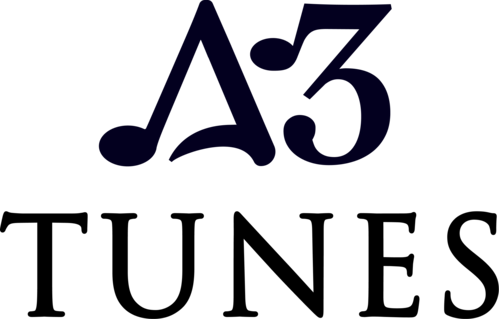A3 Tunes - Frequently Asked Questions (FAQs)
Answers on music distribution, royalties & A3 Tunes support.
Categories
What is the difference between a record label and a music publisher?
A record label primarily focuses on recording, producing, and distributing music to audiences, while a music publisher manages the ownership and royalties of the underlying composition. Labels often work with recorded versions of songs, while publishers deal with the actual songwriting and lyrics. This means a record label helps artists gain exposure and fans, while a music publisher ensures they earn revenue whenever their music is used commercially. Many independent artists today choose to work directly with a publisher or a publishing administration service, even without signing to a label, as it allows them to maintain control while monetizing their music effectively.
How do music publishing royalties work?
Music publishing royalties are the payments that songwriters and composers earn whenever their music is used. There are different types: performance royalties (for live plays, radio, and streaming), mechanical royalties (for reproductions like CDs and downloads), and synchronization royalties (when music is used in film, ads, or TV). Publishers track and collect these royalties on behalf of artists, ensuring no revenue is missed. Without a publisher, artists often struggle to monitor every platform and territory where their music is played. Proper publishing ensures musicians not only create but also get fairly compensated for the reach and impact of their work.
What is music publishing and why is it important for artists?
Music publishing is the business of managing and protecting the rights of a songwriter or composer’s music. It ensures that when a song is used commercially—whether on streaming platforms, in films, TV shows, radio, or live performances—the rightful owners get paid. For artists, this is crucial because publishing secures royalties that may otherwise be lost without proper tracking. Beyond financial gain, music publishing also provides legal protection, ensuring that works are not misused or exploited without permission. For emerging and established artists alike, understanding music publishing is the foundation of turning creativity into a sustainable career.
What genres or types of music can be distributed through A3Tunes?
A3Tunes supports artists across all genres, from pop, hip-hop, EDM, and rock to niche categories like classical, jazz, or traditional folk music. The beauty of digital music distribution is that there are no boundaries—your music can find audiences globally, regardless of language or style. A3Tunes ensures equal opportunities for every musician by delivering songs to the most popular streaming services worldwide. Whether you’re an emerging rapper, a seasoned rock band, or a local artist experimenting with unique sounds, A3Tunes gives your music the exposure it deserves, helping you connect with fans across different cultures and countries.
How are royalties paid in digital music distribution and what makes A3Tunes reliable?
When your music is streamed, downloaded, or purchased, royalties are generated. These royalties vary depending on the platform, country, and type of use. A3Tunes simplifies this complex process by collecting royalties from all platforms and providing artists with clear, timely payments. Unlike some distributors that delay or withhold earnings, A3Tunes ensures fast and transparent payouts, so you always know where your money comes from. By offering detailed royalty reports, the platform gives musicians confidence and control over their income. This reliability makes A3Tunes not just a distributor but a trusted financial partner for every independent artist.
Can I retain ownership of my music with digital distribution through A3Tunes?
Yes, with A3Tunes, you keep 100% ownership of your music. Many artists worry about losing control when they sign with labels or even when working with certain distributors. However, A3Tunes is built with independent musicians in mind. You upload your tracks, choose the platforms for release, and continue to own your masters and publishing rights. This means you remain in charge of how your music is used, promoted, and monetized. Retaining ownership ensures that you benefit from long-term royalties while having the freedom to make future deals, collaborations, or licensing agreements without restrictions.
How does A3Tunes help with digital music distribution compared to other platforms?
A3Tunes stands out by providing more than just uploading your music to streaming services. Unlike generic distribution platforms, A3Tunes offers personalized support, royalty transparency, and global reach. Artists receive real-time insights into their streams and earnings, ensuring they understand how their music is performing. Additionally, A3Tunes focuses on empowering musicians by providing tools for copyright protection, marketing guidance, and artist branding. While many distribution companies charge high fees or take a large percentage of royalties, A3Tunes ensures fair payouts, making it a cost-effective and artist-friendly solution for anyone serious about building a sustainable career in music.
What is digital music distribution and why is it important for independent artists?
Digital music distribution is the process of making your songs available on online platforms such as Spotify, Apple Music, Amazon Music, and YouTube Music. In the past, artists relied heavily on record labels for distribution, but today independent musicians can reach global audiences without a middleman. By using digital music distribution services like A3Tunes, artists gain access to a wider listener base, collect royalties efficiently, and maintain full control over their music. This not only maximizes revenue but also ensures that your music is heard by the right audience worldwide, strengthening both exposure and credibility.
Can I update my payment or bank details?
How do I upgrade or renew my plan?
Can I download reports?

Bengaluru, INDIA
2025 A3 Tunes.All Rights Reserved

Bengaluru, INDIA
2025 A3 Tunes.All Rights Reserved